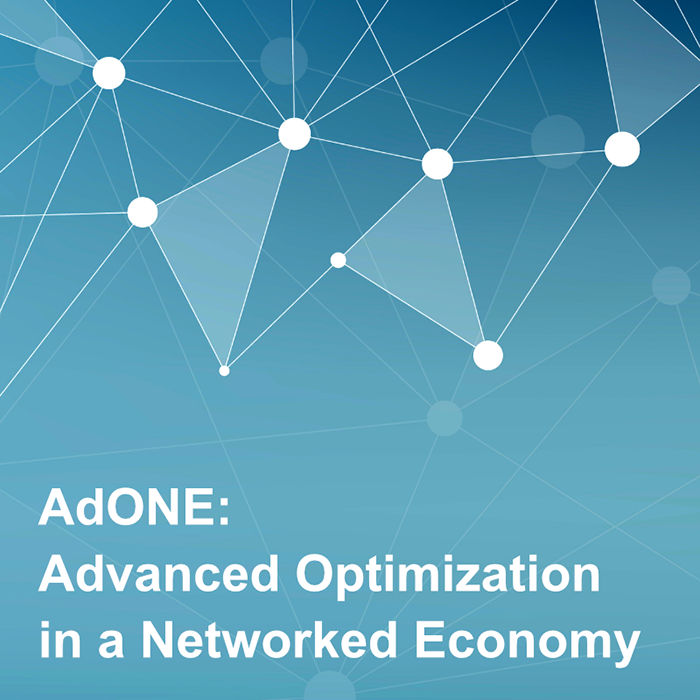
Academic Excellence
Research and teaching at the interface of management and technology.

Cutting-edge research and teaching
TUM School of Management conducts cutting-edge research and teaching at the interface of management and technology. Founded in 2002, it consistently leads the ranking of business schools in Germany.
TUM School of Management attracts students and researchers from all over the world. Its mission is to turn enthusiasm for innovation and technology into real products by teaching the necessary management skills in our study programs. We believe that entrepreneurship and social responsibility go hand in hand. These are the values we pass on to our students. Based on our interdisciplinary teaching approach, we train future managers who feel equally at home talking to management experts, engineers, and scientists. Thanks to the entrepreneurial environment at TUM, a considerable number of our graduates start up their own businesses in technology-based industries.
In the coming years, we want to address the most important far-reaching developments in the course of digitalization, the UN goals for sustainable development, and globalization. We will use our research expertise to contribute to solving social challenges. We will train our students to meet the challenges arising from the digital transformation and raise awareness of issues related to sustainable development. We will use the opportunities offered by digitization for our research, teaching, and learning.
Since the founding of the TUM School of Management in 2002, our efforts in research have been widely recognized in prestigious rankings, confirming our leading position.
Professor in Management of Digital Food Businesses
Position Details
Professorship in Management of Digital Food Businesses
Your Application:
For a Potential W2 (with Tenure Track to W3) or W3 Associate
Selected funded projects

TUM Sustainability Hotspot: New TUM SEED Center
TUM SEED is a Center of Excellence in Research and Teaching, selected and supported by DAAD, with funds from the Federal Ministry for Economic Cooperation and Development. SEED stands for “Sustainable Energies, Entrepreneurship and Development in the Global South“. It is a long-term initiative that aims at making contributions to one of the grand societal challenges of our time: the fact that one billion people lack access to electricity.
The TUM SEED Center was founded at the beginning of 2020. It conducts interdisciplinary research and offers higher education at the intersection of sustainable energy and entrepreneurship, aimed at tackling Sustainable Development Goal 7 – clean and affordable energy for all by 2030. The core team includes Prof. Dr. Frank-Martin Belz (Director), Johannes Winklmaier (Project Coordinator), Michelle Zombory (Project Coordinator) and Sofia Abid (Communications).
The TUM SEED Center collaborates closely with the following organizations:
- Bahir Dar University, Ethiopia
- Bandung Institute of Technology, Indonesia
- Indian Institute of Technology Bombay, India
- Jomo Kenyatta University of Agriculture and Technology, Kenya
- Kwame Nkrumah University of Science and Technology, Ghana
- Makerere University, Uganda
- Namibia University of Science and Technology, Namibia
- Pontificia Universidad Católica del Perú, Peru
The partner universities in the Global South will co-create “Living Labs“ to conduct research and teaching with impact. The Living Labs provide electricity for people in the rural areas of the Global South in the form of sustainable energy systems, and enable experimental learning for students, international exchange and research beyond borders.

DFG Research Training Group ”Advanced optimization in a networked economy” (AdONE)
The Research Training Group AdONE is funded by the German Research Foundation (Deutsche Forschungsgemeinschaft, DFG) and is a joint project of the TUM School of Management and the Faculties of Mathematics and Computer Science. During the project duration of 9 years (September 2017 to August 2026) participating researchers and doctoral students work together to develop innovative mathematical methods for the optimal allocation and coordination of resources in modern logistics networks, transportation, and mobility systems. With applications in airport operations, auction mechanisms, autonomous mobility, car sharing systems, production planning, vehicle routing, or warehousing, AdONE creates the scientific foundations for the continued economic success of many companies in a rapidly changing economic environment.
Doctoral students receive optimal conditions for their doctorate within the framework of the Research Training Group: Embedded in a large research project and an interdisciplinary network of scientists, they can focus on their research and receive financial support for three years. At the same time, they undergo a qualification program that supports them in their research and prepares them for various career paths through the acquisition of interdisciplinary skills. The Research Training Group AdONE also provides other doctoral students with similar interests access to its network and events.
For further information, please click below or contact Dr. Isabel Koch.

Biotech Ecosystem Germany
The project “Biotech Ecosystem Germany” was triggered by the notion that there is still a significant discrepancy between the outstanding scientific research in Germany and its unsatisfactory transfer into marketable products that contribute to economic value creation. While limited access to capital is often a first-choice explanation, we want to shed light on the wider ecosystem, highlighting the context with pros and cons of the German setting.
On the financial side, we see that only 1.5% of a total of € 6.2 billion in venture capital for German start-ups was invested in biotech companies in 2019 (Start-up Barometer, Jan 2020, Ernst & Young). Of the € 479 million in venture capital invested in German biotech companies in 2019, 61% (€ 290 million) is attributable to one single company – BioNTech (Deutscher Biotechnologie-Report 2020, Ernst & Young). After zero IPOs in 2018, there were two IPOs of German biotech companies in 2019. However, both of which were listed on the NASDAQ of the US stock exchange.
From an educational perspective, we notice that many scientists are not familiar with business concepts, as their studies were primarily focused on the scientific side and didn’t cover any business aspects. As the desired transfer of science into technologies needs a business perspective, we aim to overcome this hurdle by creating a comprehensive “business for scientists” course. The course is based on cases from the field of biotechnology start-ups to convey the necessary knowledge in a hands-on manner. Thus, the project strives to promote the transfer of scientific knowledge into economic value creation. It thereby adds to numerous initiatives by the federal government to support the biotech industry and thereby strengthen Germany as a hub for innovation. Its results are twofold and will include an extensive analysis of the strength and weaknesses of the German biotech ecosystem that serves as input for future measures. Additionally, it will provide practical business know-how for natural scientists to assist in the establishment of new biotech businesses and improve their chances of success.
The project team is led by Dr. Svenja Jarchow, who brings in her expertise as a trained molecular biotechnologist and entrepreneurial finance researcher. Stefanie Weniger focuses on the development of the entrepreneurship training program for natural scientists, while Steffen Grebe works primarily on the Study to identify the strengths and weaknesses of the German biotech start-up ecosystem. The three-year research project is sponsored by the Federal Ministry of Research and Education (FMER) as part of the national GO-Bio initiative.






